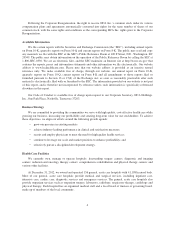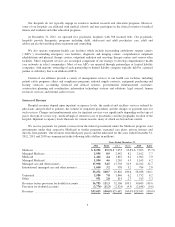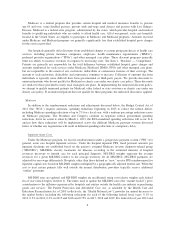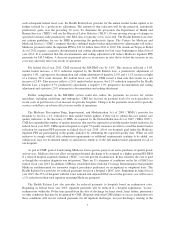HCA Holdings 2012 Annual Report Download - page 18
Download and view the complete annual report
Please find page 18 of the 2012 HCA Holdings annual report below. You can navigate through the pages in the report by either clicking on the pages listed below, or by using the keyword search tool below to find specific information within the annual report.Disproportionate Share Hospital Payments
In addition to making payments for services provided directly to beneficiaries, Medicare makes additional
payments to hospitals that treat a disproportionately large number of low-income patients (Medicaid and
Medicare patients eligible to receive Supplemental Security Income). DSH payments are determined annually
based on certain statistical information required by HHS and are calculated as a percentage addition to MS-DRG
payments.
Under the Health Reform Law, beginning in federal fiscal year 2014, Medicare DSH payments will be
reduced to 25% of the amount they otherwise would have been absent the law. The remaining 75% of the amount
that would otherwise be paid under Medicare DSH will be effectively pooled, and this pool will be reduced
further each year by a formula that reflects reductions in the national level of uninsured who are under 65 years
of age. Each DSH hospital will then be paid, out of the reduced DSH payment pool, an amount allocated based
upon its estimated cost of providing uncompensated care, which is not the current basis for DSH payments. It is
difficult to predict the full impact of the Medicare DSH reductions. The CBO has estimated $22 billion in
reductions to Medicare DSH payments between 2010 and 2019, while for the same time period, CMS has
estimated reimbursement reductions totaling $50 billion. The Health Reform Law does not mandate what data
source HHS must use to determine the reduction, if any, in the uninsured population nationally. In addition, the
Health Reform Law does not contain a definition of uncompensated care. How CMS ultimately defines
uncompensated care for purposes of these DSH funding provisions could have a material effect on a hospital’s
Medicare DSH reimbursements.
Hospitals that provide care to a disproportionately high number of low-income patients may receive
Medicaid DSH payments. The federal government distributes federal Medicaid DSH funds to each state based on
a statutory formula. The states then distribute the DSH funding among qualifying hospitals. States have broad
discretion to define which hospitals qualify for Medicaid DSH payments and the amount of such payments. The
Health Reform Law will reduce funding for the Medicaid DSH hospital program in federal fiscal years 2014
through 2020 by the following amounts: 2014 ($500 million); 2015 ($600 million); 2016 ($600 million); 2017
($1.8 billion); 2018 ($5 billion); 2019 ($5.6 billion); and 2020 ($4 billion). The Jobs Creation Act and the
American Taxpayer Relief Act of 2012 provide for additional Medicaid DSH reductions in federal fiscal years
2021 and 2022 estimated at $4.1 billion and $4.2 billion, respectively. How such cuts are allocated among the
states and how the states allocate these cuts among providers, have yet to be determined.
TRICARE
TRICARE is the Department of Defense’s health care program for members of the armed forces. For
inpatient services, TRICARE reimburses hospitals based on a DRG system modeled on the Medicare inpatient
PPS. For outpatient services, TRICARE reimburses hospitals based on a PPS that is similar to that utilized for
services furnished to Medicare beneficiaries. If the President and Congress do not take action by March 1, 2013,
the BCA will require spending reductions that will impact the TRICARE program. Unlike with the Medicare
program, the BCA does not provide for a 2% cap on these spending reductions.
Annual Cost Reports
All hospitals participating in the Medicare, Medicaid and TRICARE programs, whether paid on a
reasonable cost basis or under a PPS, are required to meet certain financial reporting requirements. Federal and,
where applicable, state regulations require the submission of annual cost reports covering the revenues, costs and
expenses associated with the services provided by each hospital to Medicare beneficiaries and Medicaid
recipients.
Annual cost reports required under the Medicare and Medicaid programs are subject to routine audits, which
may result in adjustments to the amounts ultimately determined to be due to us under these reimbursement
programs. These audits often require several years to reach the final determination of amounts due to or from us
under these programs. Providers also have rights of appeal, and it is common to contest issues raised in audits of
cost reports.
14
























